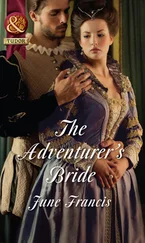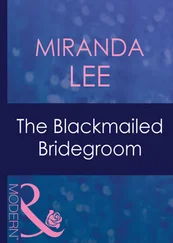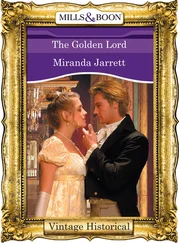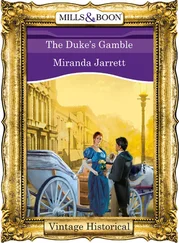His weight shifted, just enough for his foot to make the floorboard beneath it squeak. She twisted around in her chair and caught her breath, a slice of bread with jam forgotten in her fingers.
“You!” she cried, her cheeks flushing a furious pink. “How did you come here? How did you find me?”
“Calm yourself, Lady Mary, please, I beg you!” he exclaimed, holding one hand palm up to signal for quiet, and the other brandishing the flowers. He’d told Madame Gris that she could interrupt if she heard the girl object, and he had no doubt that the innkeeper’s wife would enjoy doing exactly that. “I don’t mean you the least bit of harm!”
“Oh, no, no, I didn’t intend that.” Hastily she rose to her feet in a swirl of white linen, the bread still in her hand. “That is, you have surprised me, but I—I am not upset. Not in the least, not when—oh, blast!”
A forgotten, glistening blot of red jam dropped from the bread in her hand and splattered on her arm, barely missing her white sleeve. She dropped the bread, grabbed the napkin from the table, and slapped it over the jam, pressing the cloth there as if she feared the errant jam would somehow escape to shame her again.
John smiled: not only because he knew he was the cause of her being so discomfited, but because that extra blush and fluster was a side of her he hadn’t seen at Dumont’s. There she’d been so much in control of herself that she’d been able to steal the painting away from him. But now—now she was as rattled as a cracked teacup, and all because of a blot of jam.
“I’ll have you know I’m not like this, my lord,” she confessed. “Not generally. Not at all.”
“I’m not like this, either,” he said. “Rising at this unholy hour, begging Madame Gris for entrance, startling ladies at their breakfast. Not like me at all.”
“Of course it’s not.” She rubbed the napkin over her arm one last time to make sure the jam was gone, crushed the napkin into a lumpy knot, and stuffed it under the edge of her plate. “I wouldn’t give you permission to walk with me yesterday, but if you ask to take breakfast with me now—even though it’s a meager sort of French breakfast, without eggs or meats—why, I shall agree.”
“You will?” No matter how confident he’d been before, he hadn’t expected this invitation. Not that he meant to accept it. Because he half expected her sister or governess to join her at any moment, he’d rather coax her out-of-doors, away from the inn, where he’d be sure to keep her company to himself. He already had an image of the seasick sister: plain and peevish and nothing like Lady Mary, and as for the governess—well, she was a governess. “You’ll walk with me after all?”
“I will.” At last she smiled, only a moment. “It’s not often one has the chance to set mistakes to rights. Those flowers are quite lovely. Are they for me?”
He handed the bouquet to her with the same bow that yesterday had earned him only disdain. Now she took the flowers with a happy little chuckle, cradling them in her arms.
“So you will accept flowers,” he teased, bemused, “but not a picture.”
She looked down at the flowers, then back at him. “I suppose that’s a contradiction, isn’t it?”
He shrugged. “Only a small one. Life is full of contradictions. None of them really signify.”
“But this does,” she insisted, once again the serious girl from yesterday. “That painting has already existed for hundreds of years, and with luck and care will exist for hundreds more. Yet these flowers, however lovely, will not last more than a day or two. Which makes them far more appropriate as a token from you to me.”
“Lady Mary,” he teased, striving to seem wounded. “Are you implying that my admiration for you will only last a day or two?”
“Admiration, fah,” she scoffed. “You must know me to admire me, and you’ll scarce have time for either one. Come to the window. Do you see those men in the yard with the blue carriage?”
He came to stand beside her, exactly as he’d been told, and exactly as he’d wished. The window was small, and to look through it with her as she’d ordered, he had to stand so close beside her that he could smell the scent of lavender soap on her skin.
“I see it,” he said evenly, as if standing beside her without touching her wasn’t a refined kind of torture.
“That’s our coach,” she said, “or rather, my father’s coach, though how bitterly he complained over the French taxes he had to pay for the privilege of the convenience! It was sent in pieces on the boat from England, and once the men have put it back together, we’ll be ready to leave for Paris. We’ve already sent a wagon ahead two weeks ago, filled with more trunks to the apartments we’ve let in Paris.”
“He could have hired a cabriolet here for less than the taxes.” John had heard of the richer and more cowardly English who’d import their own carriages to the Continent, but he’d never seen one for himself until now. “Your driver will have the devil of a time maneuvering that great beast on French roads. Monsieur Dessin has tidy cabriolets for a louis a week.”
She sighed. “Father didn’t trust hired carriages. He won’t even use a post chaise. He says they’re unsafe, and that the cushions harbor fleas and bedbugs.”
“So instead he would rather import a carriage just for you,” John said, almost—almost—feeling sympathy for her insulated plight. “What better way to spare you from having any actual contact with the people, let alone their bedbugs, whose country you are crossing?”
“That was Father’s decision,” she said, and John liked the way she made it clear she didn’t agree with her father. “You cannot imagine how difficult it was to persuade him to allow me to leave Kent, let alone come to France.”
He smiled, thinking of how different it was for well-bred boys and girls, especially when the difference was widened by wealth, or the lack of it. “My father was so eager for me to leave home that he shipped me off to Calcutta when I was fourteen, with the sum of my belongings in a single trunk.”
“Calcutta!” she said, her dark eyes widening with wonder. “Oh, what adventures you must have had there!”
“Oh, by the score,” he said lightly, for most of his adventures in the service of the East Indian Company were not the sort he’d wish to share with her. “Likely more than you’ll find if you stay locked in Papa’s coach.”
“But I’ve already had two adventures, my lord.” Her chin rose with the same challenge that she’d shown the day before, and he could see the swift rise and fall of her pulse at the side of her throat. “I cannot believe you haven’t guessed them.”
“Only because you haven’t asked me to.”
She laughed, her eyes sparkling with her secret. “I bought my first painting yesterday.”
“Ahh, the picture.” He needed to talk to her about that painting, and his suspicions about it, and about Dumont—all of which would certainly qualify as an adventure by anyone’s lights. That had been the main reason he’d permitted himself to come call on her here in the first place. But now that he was here, with her telling secrets, he didn’t want to be…distracted by the painting. Not yet. “I suppose in Kent, that would be considered an adventure. Though I’m almost afraid to ask after the second.”
“You shouldn’t,” she said, her voice once again dropping to a breathless whisper. “My second adventure was meeting you.”
“You flatter me, my lady.” He chuckled, delighted with her answer. For whatever reason, she’d clearly thought better of running away from him yesterday. Now it seemed as if she were practically willing to leap into his arms—yet still, somehow, on her own terms. He took the flowers from her arms and tossed them back onto the table, his gaze never leaving hers. “I wouldn’t say we’ve had an adventure, not yet.”
Читать дальше












